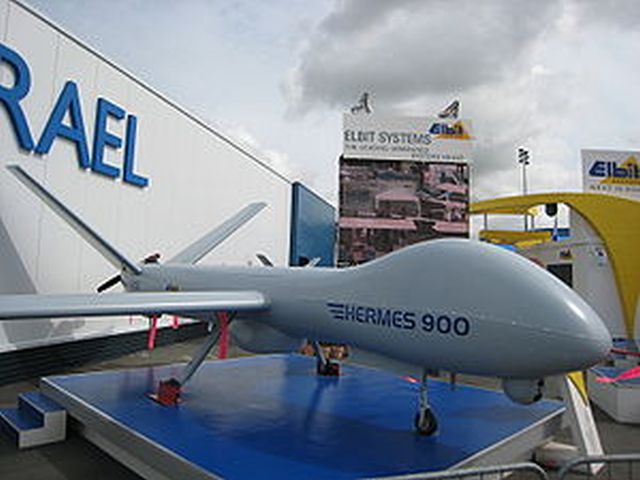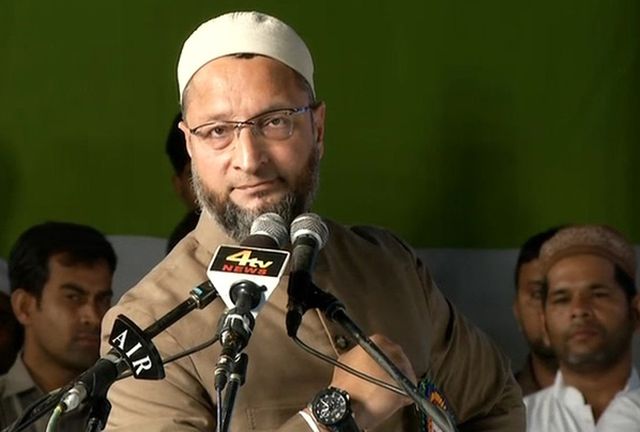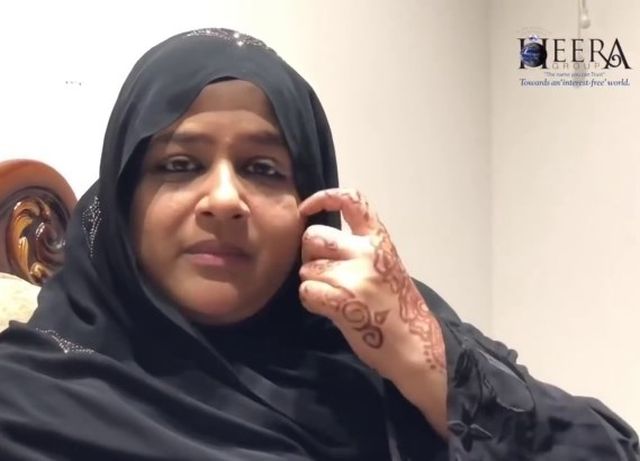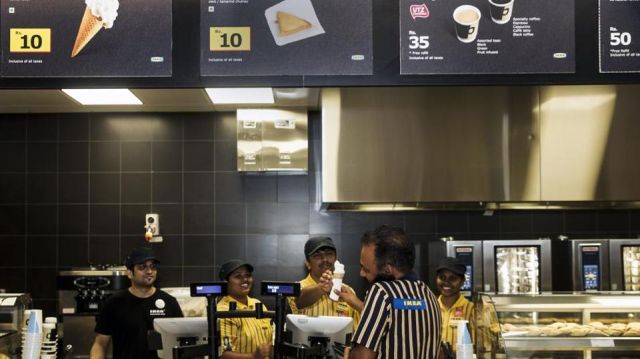
by admin | May 25, 2021 | Business, Corporate, Corporate Buzz, Emerging Businesses, Large Enterprise
 Hyderabad : India’ first private sector unit for manufacturing unmanned aerial vehicles (UAVs) opened at Adani Aerospace Park here on Friday.
Hyderabad : India’ first private sector unit for manufacturing unmanned aerial vehicles (UAVs) opened at Adani Aerospace Park here on Friday.
Built by the Adani Group and Israel-based Elbit Systems, the 50,000 square feet facility will develop Hermes 900 medium altitude long-endurance UAVs for the Indian and global markets.
The unit will begin with the manufacture of complete carbon composite aerostructures for Hermes 900, followed by Hermes 480, catering to global markets. It will further be ramped up for assembly and integration of complete UAVs.
The plant has been built at Adani Aerospace Park, the first defence and aerospace complex of Adani Group, at Hardware Park on the outskirts of Hyderabad.
The facility also houses advanced composites and high precision machining capabilities.
The plant was inaugurated by Telangana’s Home Minister Mohammad Mahmood Ali in the presence of Pranav Adani, Adani Enterprise Ltd, Karan Adani, CEO, Adani Ports and Special Economic Zones, Bezhalel Machlis, President and Chief Executive Officer, Elbit Systems and Ashish Rajvanshi, Head Adani Defence and Aerospace.
—IANS

by admin | May 25, 2021 | News, Politics
 Hyderabad : AIMIM President Asaduddin Owaisi said he went to Telangana Chief Minister K. Chandrashekhar Rao’s residence riding his motorbike on Monday as he wanted to show how peaceful Hyderabad is to those who talked about driving him away.
Hyderabad : AIMIM President Asaduddin Owaisi said he went to Telangana Chief Minister K. Chandrashekhar Rao’s residence riding his motorbike on Monday as he wanted to show how peaceful Hyderabad is to those who talked about driving him away.
“This is my city,” the Hyderabad MP quipped when asked about his bike ride to Pragati Bhavan, where he had three-hour meeting with Rao ahead of the declaration of Assembly election results on Tuesday.
“I want to show how peaceful Hyderabad is to those who wanted to drive us away and cut our throat,” said Owaisi.
He was referring to Uttar Pradesh Chief Minister Yogi Adityanath and Telangana BJP leader Raja Singh’s threats.
While campaigning for the BJP, Yogi had said that if the BJP came to power in Telangana, it will make Owaisi flee the way Nizam was forced to flee Hyderabad.
BJP leader and party candidate Raja Singh threatened to cut the throat of AIMIM leader Akbaruddin Owaisi, the younger brother of Asduddin Owaisi.
During the luncheon meeting, Owaisi and the Telangana Rashtra Samithi (TRS) chief discussed the strategy to be adopted after the results are known on Tuesday.
Owaisi, however, told reporters that he was sure the TRS will retain power and KCR will once again become the Chief Minister.
Owaisi ruled out MIM joining the TRS government, saying they were never after power.
The AIMIM had seven members in the previous 119-member Assembly and this time the party contested eights seats, all in Hyderabad. In the rest of the state it extended support to TRS.
—IANS

by admin | May 25, 2021 | Entrepreneurship, Islamic Finance, News, Social Entrepreneur
 By Mohammed Shafeeq,
By Mohammed Shafeeq,
Hyderabad : There is no dearth of generous people in society who want to do something for the less fortunate, but their help often doesn’t reach the needy or gets misappropriated. To make charity a satisfying experience that brings the intended results to both benefactor and beneficiary, a Hyderabad-based group, Safa Baitul Maal, is showing the way by creating and using data to link the rich with the poor and needy.
Every month, this educational, welfare and charitable trust spends Rs 70-80 lakh on its charitable activities in different states. Set up by Moulana Gayas Ahmed Rashadi in 2006, the organisation has 70 branches in Telangana, Andhra Pradesh, Karnataka, Maharashtra, Assam, Jharkhand, Uttar Pradesh, Odisha and Madhya Pradesh.
Headed by a group of five “ulemas” or religious scholars, Safa Baitul Maal has a 450-strong staff who are paid salaries. “We make sure that the aid by the rich reach those who are genuinely needy,” Moulana Rashadi told IANS.
He is also trying to bring ulemas into the field of charity. The organisation is roping in the imams of mosques in its activities. “The imam of a mosque is not just the head of that mosque but he is the head of the people of his area, irrespective of their religion,” he said.
Every day the organisation’s call centre in Hyderabad receives 400-500 calls, both from those who are in need of help and those who want to donate. The organisation ensures transparency in such a way that every donor can get all the details of how his money was spent and the names and contact numbers of the beneficiaries.
“Whoever approaches us seeking help has to provide all the details and we send our people to cross-check the information provided by the applicant,” said M.A. Muqtadir Imran, in-charge of the Safa’s branches.
Based on the findings of the survey, the applicants are issued white, yellow or pink cards, enabling them to receive aid in varying degrees.
Safa Baitul Maal receives ‘Zakat’, ‘Fitra’, ‘Sadqa’ and other charities and donations from the people. However, collection of house-hold scrap is its biggest source of income. On an average, it receives 100 calls to pick up old items from houses in Hyderabad.
The group runs 12 vehicles to pick up the scrap and shift it to its workshop. Some items, which are in good condition, are repaired and sold at its unit at Bandlaguda at affordable prices to mobilise funds. The organisation earns Rs 18-19 lakh from scrap and the money is ploughed back into charity activities.
In Hyderabad alone, the organisation is sponsoring the education of 150 orphans, spending Rs 2,000 on each child per month on school fees and food. A representative visits the schools to monitor their academic progress. The children are provided free uniforms and books.
In addition, Rs 1,000 is deposited every month for every student in a mutual fund to take care of their higher education. Half of this money is contributed by another organisation, the Saleha Rasheed Trust.
A similar number of widows are provided assistance of Rs 1,000 each while the physically and mentally handicapped are given Rs 1,000 to Rs 2,000.
In poor and backward neighbourhoods like Kishan Bagh and Baba Nagar, Safa conducted surveys to identify orphans, widows, the handicapped and others who are really in need of help.
Every day, the organisation conducts medical camps in 26 identified slums in Hyderabad, covering one slum every day. The beneficiaries are examined by a team and are given free medicines. The white card holders are also eligible for free tests in a diagnostic centre run by Safa. It also runs three healthcare centres. The trust spends Rs 8 lakh every month on health activities.
The organisation has a unique system for providing assistance for marriages. Safa extends help on condition that the marriages should be performed on its date, with its expenses and at its venue. “We spend Rs 50,000 to Rs 60,000 on each marriage, providing the couple with furniture and house-hold items,” Imran said.
Safa runs 10 tailoring centres, which train over 1,000 women. It invites fashion designers to train the faculty. A manufacturing centre set up by the state government’s Minorities Welfare Department and administered by Safa trains dozens of women with 40 machines.
Safa also provides microfinance through interest-free loans to small businessmen. Vendors take Rs 3,000 a week as loan and they are allowed to repay in six weeks. Those prompt in repayment are extended higher assistance.
In the holy month of Ramadan, Safa distributes 25,000 ration packets worth 50 lakh among the needy. It also distributes packets on Eid.
On Eid-ul-Azha, Safa organises the sacrifice of cattle in 600 villages across different states to ensure that the poor and the needy get meat.
As lot of food is wasted in Information Technology companies every day, Safa recently tied up with couple of MNCs to collect food, pack it and distribute it among the hungry.
Digging of borewells, distribution of sewing machines among women, education kits to poor students, arrangement to provide drinking water at few government-run hospitals during summer, distribution of blankets among madarsa students and those living on footpaths, construction of mosques in villages and summer camps for students are some of the other activities of Safa.
Organisations like Hyderabad Zakat and Charitable Trust (HZCT) and Helping Hand are also tying up with Safa Baitul Maal to provide assistance to the needy.
Rahman Foundation run by eminent religious scholar Moulana Sajjad Naomani in Uttar Pradesh sent its staff to Safa for training. Assam MP Badruddin Ajmal, along with a team from his Ajmal Foundation, also visited Safa to study its unique functioning.
(The weekly feature series is part of a positive-journalism project of IANS and the Frank Islam Foundation. Mohammed Shafeeq can be contacted at m.shafeeq@ians.in )
—IANS

by admin | May 25, 2021 | Entrepreneurship, News, Politics, Women Entrepreneur

Nowhera Shaik
Hyderabad : Hyderabad police on Tuesday arrested leading entrepreneur-politician Nowhera Shaik on charges of allegedly cheating the investors.
Nowhera, Managing Director of Heera Group of Companies, was arrested in New Delhi and brought to Hyderabad on a transit remand, said Hyderabad Police Commissioner Anjani Kumar.
The arrest was made during the course of the investigations into a case booked against her at Banja Hills police station in Hyderabad for cheating, criminal breach of trust and criminal intimidation.
She was also booked under Telangana Deposits of Financial Establishment Act 1999 and The Prize Chits and Money Circulation Schemes (Banning) Act, 1978.
Police said it found incriminating evidence against Nowhera, who runs various businesses in India and the Middle East. She also floated All India Mahila Empowerment Party, which contested recent assembly elections Karnataka but drew a blank.
According to police Nowhera Shaik is heading 15 companies under different names under the Heera Group of companies.
“Many of the companies are involved in collection of deposits/investments in different modes of gold scheme from public, where in these companies commit a return of around 36% per annum for the invested amount,” a police statement said.
While the exact number of investors / depositors is not known because the companies have not disclosed complete information before the Police, it is estimated that the number of depositors could be in thousands in different states of the country, it added.
Police claimed that during investigation evidences of diversion of funds came to light. Evidence has also been found of purchase of assets in different names of individuals as well as companies, police said.
“Many investors have not been paid their dues since last few months by accused companies. The companies and other accused have not cooperated with Police or provided relevant information during course of investigation. The main accused also made efforts to mislead the Police and avoid the investigation,” the police chief said.
According to police more than 160 bank accounts have been identified across India, details of which are being sought from the concerned bank.
Different properties have been identified and necessary action under the Telangana Deposits of Financial Establishment Act 1999 and The Prize Chits and Money Circulation Schemes (BANNING) Act, 1978 are under consideration, added the statement.
—IANS

by admin | May 25, 2021 | Business, Commodity Market, Economy, Entrepreneurship, Investing, Markets, Medium Enterprise, News, SMEs, Startup Basics, Your Business Plan
 By Mohammed Shafeeq,
By Mohammed Shafeeq,
Hyderabad : Walking through the sprawling, newly-opened IKEA store here needs energy and the company is making sure that customers get to recharge at its trademark restaurant. The 1,000-seater restaurant is the biggest among the Swedish home furnishings retailer’s global network in 50 countries.
The thousands of customers who flocked IKEA’s first India store that opened on August 9 had a massive range of 7,500 world-class products to choose from. With 1,000 products priced below Rs 200, the affordability and the quality of the international brand was the talk of the town.
So also was the restaurant, with half its menu offering Indian and the other half Swedish food — in line with the company’s global practice.
“We cater to the local taste wherever we have our operations and half of our food here is Swedish,” Henrik Osterstrom, Country Food Manager, IKEA Food, told IANS at the restaurant, teeming with hundreds of customers.
At the India store, chicken meat balls have replaced beef meat balls, a popular dish on IKEA’s menu globally. It has also dropped pork from the menu for India.
“Since many people in India don’t eat beef, we are not selling it. As there are many Muslims, we are respecting their sentiments as well by not selling pork,” Osterstrom said.
The menu includes vegetable biryani, salmon fillet, dal makhni, cakes, green salad, fruit salad, cinnamon buns and and variety of beverages.
Osterstrom is happy with the customers’ response so far. “It’s fantastic to see so many people coming here. We are selling a lot of biryani, chicken meat balls, veggie balls and dal makhani as well,” he said.
Like its home furnishing products, IKEA is also offering a menu to suit all sizes of wallets. Vegetable biryani is priced at Rs 99, chicken meat balls at Rs 149 and veggie balls at Rs 129.
“We have ensured that the food is affordable, of high quality and of good taste. We call it Swedish-feel Indian-appeal,” said Osterstrom.
The Swedish dishes include chicken meat balls, salmon fillet, lingonberry juice and cinnamon buns.
Customers have to serve themselves — right from picking up trays and trolleys to collecting food and later leaving the trays and trolleys at designated points. The service is quick as customers collect their orders in a couple of minutes while moving in the queue along the food counters and the billing is done while heading towards their tables.
Why choose India for the company’s biggest restaurant globally? “It became like that. I think food is starting point in India. We have large restaurants in other countries, especially in Asia, where food is vital. We wanted to give a nice atmosphere and make sure that it is not crowded,” he said.
Globally, restaurants contribute 10 percent of IKEA’s sales but Osterstrom hopes it will be higher in India as big footfalls are expected. “People in India llove food. It’s just the beginning and we will see more customers.”
Over 40,000 customers visited IKEA store on the first day. The company expects at least 60 lakh footfalls annually at the store, which has come up with an investment of Rs 1,000 crore in the heart of HITEC City, the information technology hub.
IKEA plans to open 25 stores across India by 2025. The next store will open in Mumbai next year followed by Bengaluru and Delhi.
The concept of a store is integral to IKEA, founded by Ingvar Kamprad in 1943.
“Our founder, from day one, had this idea. As our showrooms are huge and it takes time for customers to go around the entire store, they feel hungry. We also have a play area for kids. It should be fun day for the whole family,” Osterstrom explained.
The restaurant is located such that if customers feel hungry, after walking through one home furnishings section of the store, they should get new energy to enter the next phase of shopping, that is, the market hall.
And, after another long walk through the market hall and checkout, customers find in front of them a cafe for refreshments. Here they get a wide range of cookies, chocolates and other delicacies. A samosa costs just Rs 10 while frozen yogurt, which tastes like soft serve ice cream, is also available at the same price.
(Mohammed Shafeeq can be contacted at m.shafeeq@ians.in)
—IANS

 Hyderabad : India’ first private sector unit for manufacturing unmanned aerial vehicles (UAVs) opened at Adani Aerospace Park here on Friday.
Hyderabad : India’ first private sector unit for manufacturing unmanned aerial vehicles (UAVs) opened at Adani Aerospace Park here on Friday.



